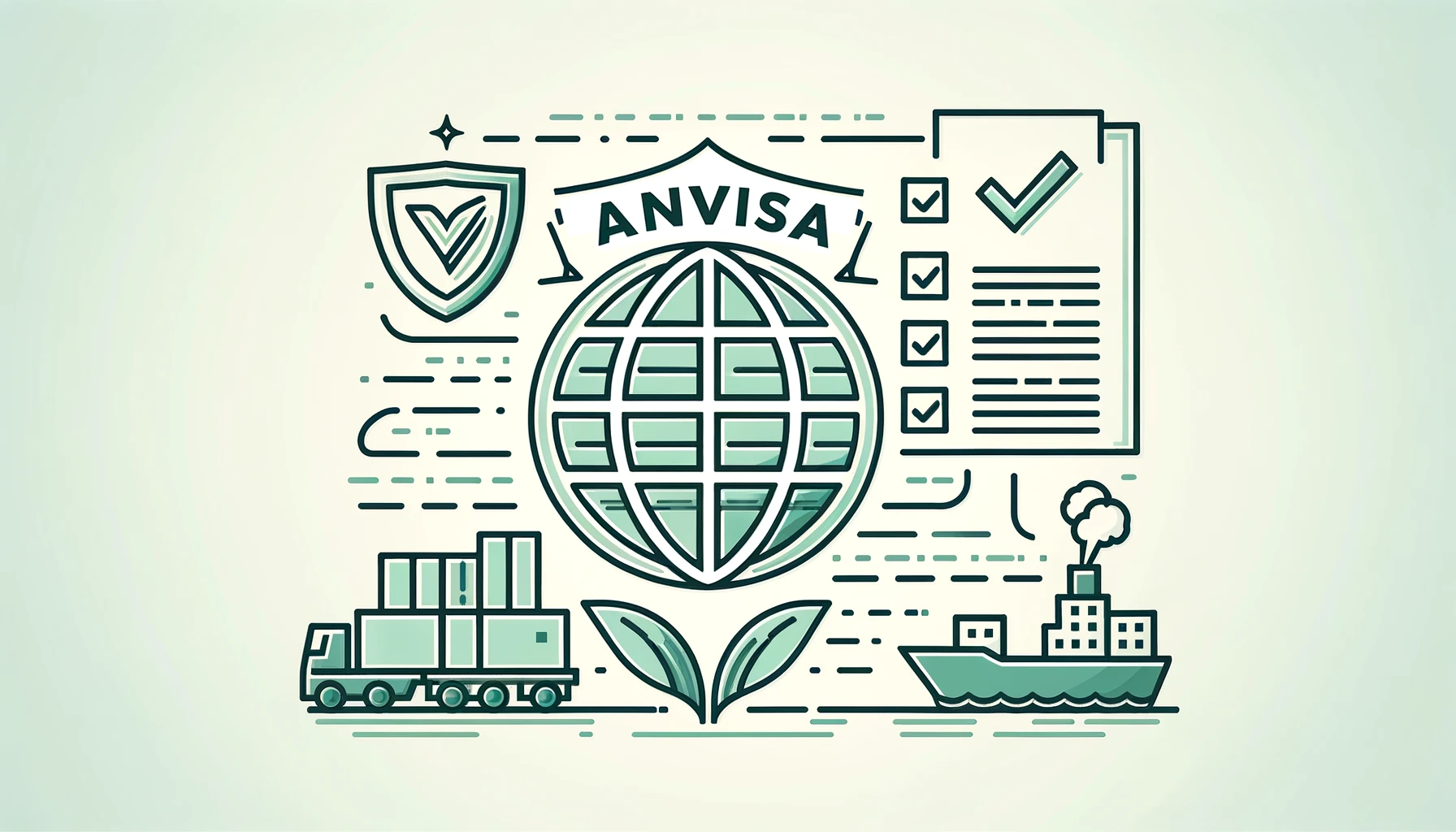A Comprehensive Step-by-Step Process for Importing Regulated Products
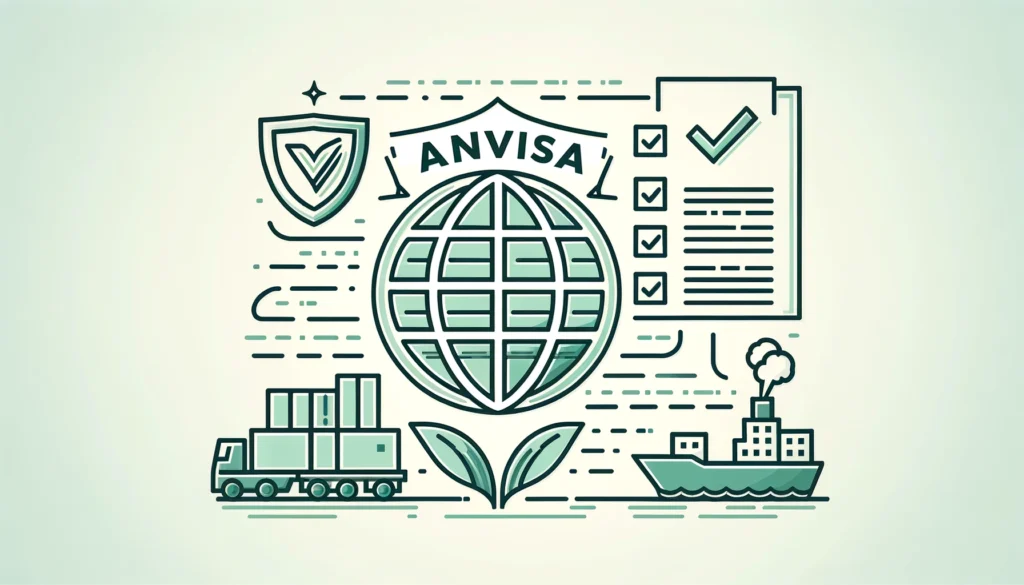
Introduction to a Guide to ANVISA Product Importation 2024
For businesses aiming to import products into Brazil, understanding the intricacies of ANVISA product importation is crucial. As a cornerstone of Brazilian health regulation, ANVISA ensures that all imported goods meet stringent safety and quality standards. This comprehensive guide to ANVISA product importation 2024 provides step-by-step instructions to help you navigate the process successfully. Whether you’re dealing with medicines, medical devices, or cosmetics, compliance with ANVISA product importation protocols is essential to avoid delays and penalties.
In this guide, we will explore what ANVISA-regulated products are, clarify what they are not, and delve into the nuances of importing each product category. By the end of this article, you’ll have a thorough understanding of the ANVISA product importation process, empowering your business to operate confidently within the Brazilian market. Trust this guide to ANVISA product importation 2024 to streamline your journey.
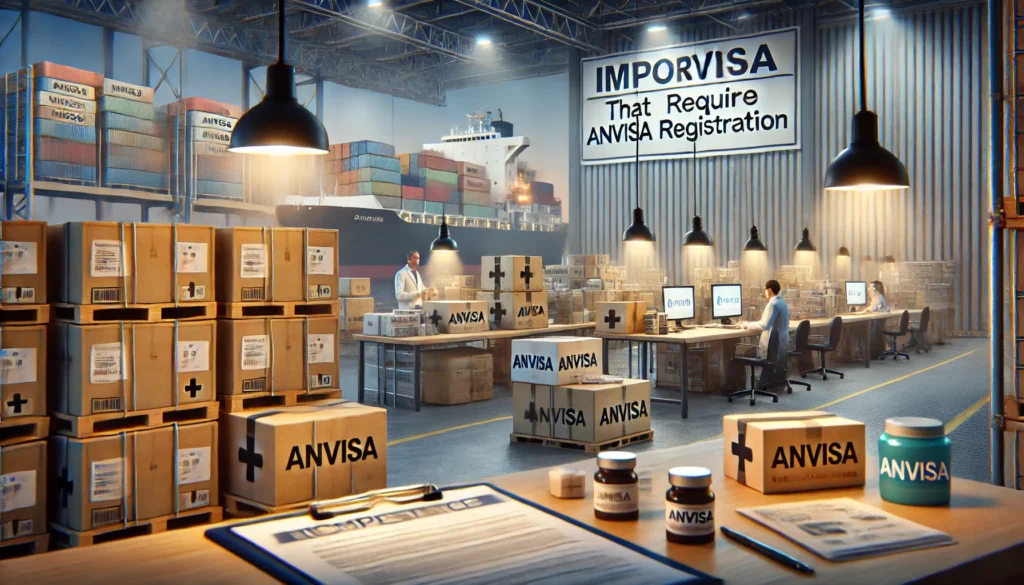
What Products Require ANVISA Registration?
Defining ANVISA-Regulated Products
Understanding ANVISA product importation starts with knowing which products fall under its regulatory scope. The Agência Nacional de Vigilância Sanitária (ANVISA) governs the importation of goods that directly impact public health, from pharmaceuticals to hygiene products. This section of our Guide to ANVISA Product Importation 2024 delves into the specific product categories that require ANVISA registration, ensuring businesses have clarity on compliance requirements. By recognizing these distinctions, importers can better navigate the regulatory landscape and avoid unnecessary complications during the process.
ANVISA oversees a wide range of products that directly impact human health. These include:
- Medicines: All pharmaceutical drugs, whether for therapeutic or diagnostic use.
- Medical Devices: Instruments or tools used in healthcare, from syringes to advanced diagnostic machines.
- Cosmetics and Personal Care Items: Products for hygiene, appearance, or fragrance, such as lotions and perfumes.
- Food Supplements and Special Foods: Products addressing specific dietary or nutritional needs.
- Sanitation Products: Disinfectants, pesticides, and other public health chemicals.
- In Vitro Diagnostics: Reagents and equipment for laboratory testing.
These categories are strictly regulated to ensure consumer safety and efficacy.
What ANVISA-Regulated Products Are Not
It’s equally important to recognize products that do not fall under ANVISA’s jurisdiction, including:
- Goods unrelated to health, such as industrial machinery.
- Items for personal use, provided they are in non-commercial quantities.
- Research-only goods that do not require direct regulatory oversight.
By distinguishing between regulated and non-regulated goods, you can better determine if your product requires compliance with ANVISA importation processes.
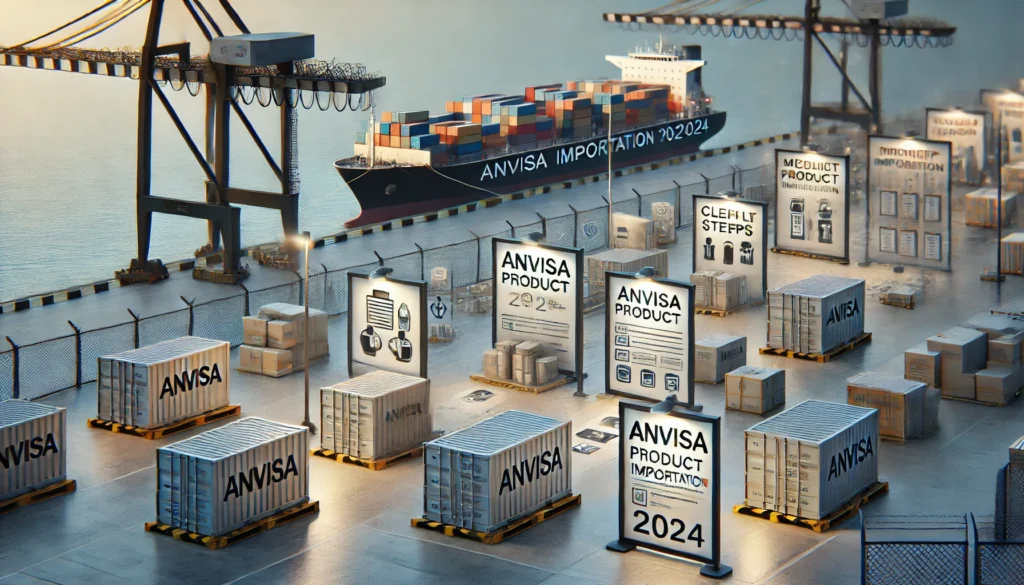
Step-by-Step Guide to ANVISA Product Importation 2024
Navigating the ANVISA product importation process requires a methodical approach to meet Brazil’s stringent regulatory requirements. From initial classification to customs clearance, each step ensures that imported goods align with health and safety standards. In this part of the Guide to ANVISA Product Importation 2024, we break down the procedure into actionable steps to facilitate a smooth journey for your business. Following these guidelines will not only expedite your importation process but also safeguard your operations against potential delays and penalties.
1. Classification and Preliminary Assessment
The first step in ANVISA product importation is to confirm whether your product requires ANVISA registration. Use the NCM (Nomenclatura Comum do Mercosul) to verify its classification. Once verified:
- Assess if the product requires registration, notification, or other approvals.
- Consult specific regulations for detailed compliance requirements.
2. Documentation Preparation
Documentation is the backbone of successful ANVISA product importation. Essential paperwork includes:
- Product Registration Certificate.
- Authorization of Functioning of the Company (AFE).
- Commercial invoices, technical dossiers, and payment proofs. Ensure all documents are accurate and adhere to ANVISA’s specific requirements.
3. Licensing and Shipment Authorization
To proceed with ANVISA product importation, you must:
- Register in the SISCOMEX system.
- Obtain pre-shipment authorization for controlled or high-risk goods.
- Secure an import license (LI) after ANVISA reviews the product’s compliance.
4. Customs Clearance and Inspection
Once the shipment arrives in Brazil:
- Submit all required documents to customs authorities.
- Cooperate with ANVISA inspections and testing as needed.
- After approval, finalize customs clearance to release your goods.
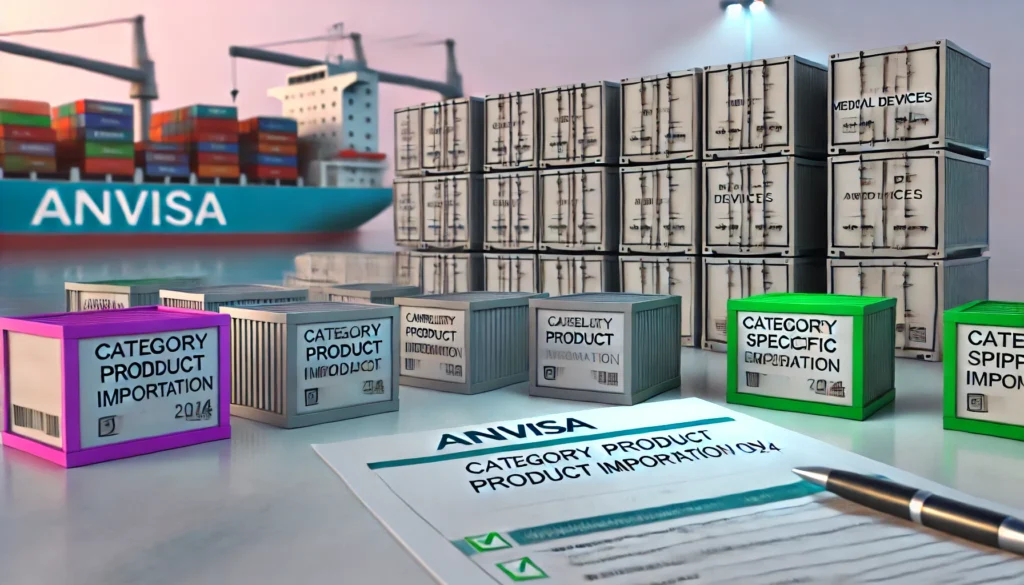
Category-Specific Guidelines for ANVISA Product Importation 2024
The ANVISA regulatory framework varies across different product types, making it essential for importers to understand category-specific requirements. In this section of the Guide to ANVISA Product Importation 2024, we outline the unique compliance protocols for medicines, medical devices, cosmetics, and more. These tailored insights empower businesses to streamline their importation efforts by addressing the precise regulations for each product group.https://www.gov.br/anvisa/pt-br/assuntos/fiscalizacao-e-monitoramento/farmacovigilancia
Medicines
ANVISA requires medicines to comply with pharmacovigilance and Good Manufacturing Practices (GMP). Pre-shipment approval is mandatory for controlled substances. Importers must also provide batch-specific quality certificates.
Medical Devices
Medical devices face unique regulatory demands. Compliance requirements include:
- Portuguese labeling for operational and safety instructions.
- Compatibility with Brazilian electrical and mechanical standards.
- Adherence to RDC No. 185/2001 and its updates.
Foods and Food Supplements
Foods and supplements require precise labeling and safety validations. Specific standards include:
- Nutritional and ingredient labeling in Portuguese.
- Additional testing for special-purpose foods like gluten-free items.
- GRAS (Generally Recognized as Safe) certification for novel ingredients.
Cosmetics and Hygiene Products
For ANVISA product importation, cosmetics and hygiene items must comply with:
- Safety and efficacy testing protocols.
- Strict guidelines for labeling and packaging as defined by ANVISA.
In Vitro Diagnostic Products
In vitro diagnostic products must meet rigorous standards, including:
- Validation of manufacturing processes and storage conditions.
- Clear labeling of all components, including reagents and equipment.
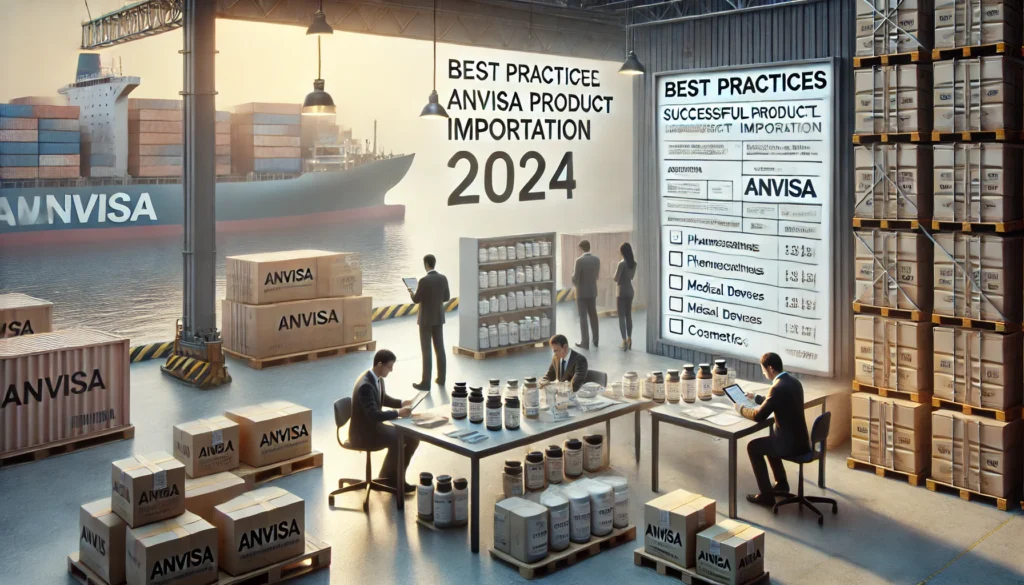
Best Practices for Successful ANVISA Product Importation 2024
Early preparation and expert guidance are key to navigating the ANVISA product importation process efficiently. Consider these best practices:
- Early Preparation: Start ANVISA registration as early as possible to accommodate lengthy processing times.
- Engage Industry Experts: Work with licensed customs brokers and legal professionals experienced in ANVISA regulations.
- Regular Compliance Checks: Stay informed about updates to RDCs (Resoluções da Diretoria Colegiada) to avoid non-compliance issues.

Conclusion to a Guide to ANVISA Product Importation 2024
Mastering the ANVISA product importation process is essential for businesses entering the Brazilian market. By understanding product classifications, preparing documentation, and following licensing procedures, importers can ensure compliance and avoid costly delays. Whether dealing with pharmaceuticals, medical devices, or cosmetics, adhering to ANVISA’s regulatory framework safeguards your business operations and consumer trust.
Take the Next Step:
Schedule a Free Consultation:
Ready to simplify your ANVISA product importation process? Visit our Contact Page to schedule a free consultation with Hegemoni Regulatory & Business Solutions today! Our team of experts is ready to guide you through every step of the 2024 importation process, ensuring full compliance and efficiency for your business unnecessary complications during the process.

